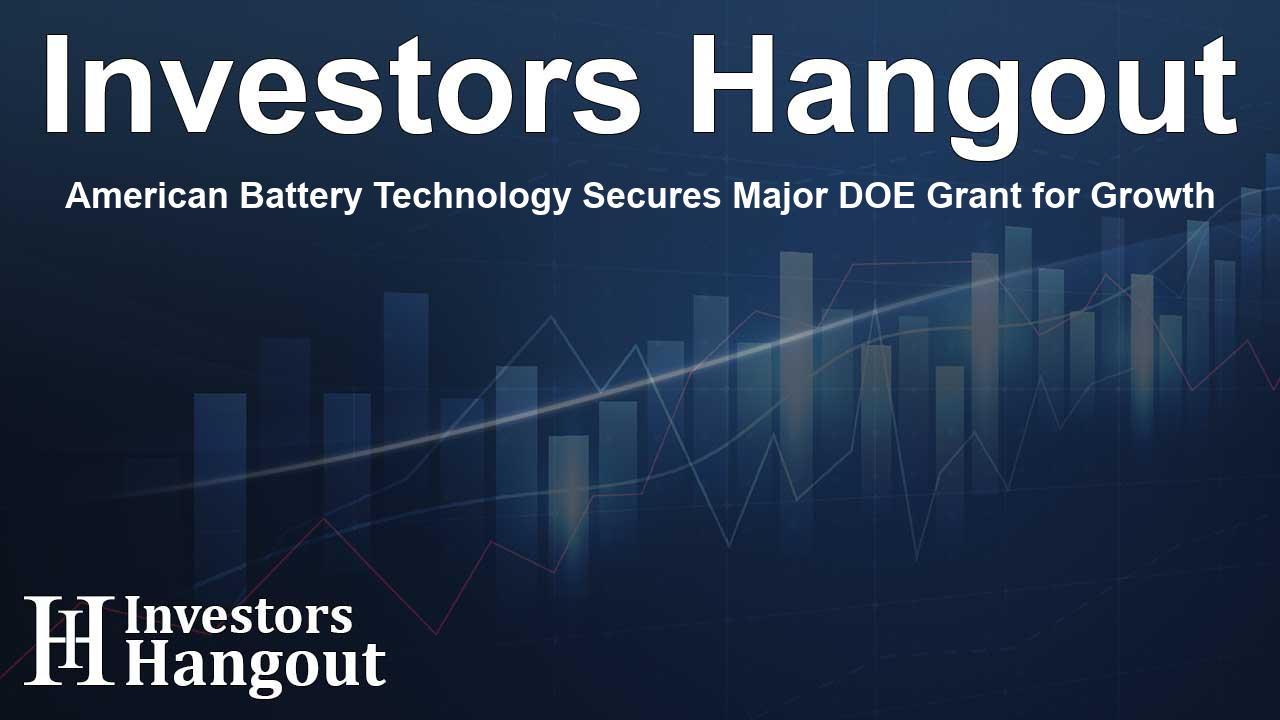American Battery Technology Secures Major DOE Grant for Growth

American Battery Technology Company Receives Significant Funding
American Battery Technology Company (NASDAQ: ABAT) has made headlines recently by securing a substantial grant of $144 million from the U.S. Department of Energy (DOE). This funding is a testament to the company’s commitment to revolutionizing lithium-ion battery recycling while meeting the increasing demand in the sustainable energy sector.
Expansion of Recycling Capabilities
The awarded grant facilitates a groundbreaking expansion of ABAT’s existing commercial lithium-ion battery recycling operations. This enhancement will introduce an impressive additional capacity to process 100,000 tonnes of battery materials annually. The new facility is expected to significantly bolster the company's capabilities, enhancing its role within the industry.
Design Innovations in Recycling Facility
This new facility will have a design capacity that is five times greater than the company’s first lithium-ion recycling plant. ABAT’s second facility will primarily focus on processing various forms of end-of-life batteries, including those from automotive manufacturers and cell producers, ensuring that vital materials are efficiently recycled.
Strategic Partnerships and Collaborations
The strategic partnership formed between ABAT and BASF, one of North America's leading cathode manufacturers, is a noteworthy aspect of this initiative. This collaboration, established in the summer of the previous year, positions ABAT to supply high-grade battery metals such as nickel, cobalt, manganese, and lithium hydroxide, which are essential for the North American market.
Innovative Recycling Processes
American Battery Technology Company is not just focusing on quantity but also on quality. The facility will utilize ABAT’s innovative processes for de-manufacturing and chemical extraction of battery grade products at competitive costs. By using advanced techniques rather than traditional high-temperature smelting or inefficient shredding systems, ABAT aims to achieve a lower environmental footprint while still meeting rigorous industry specifications.
Community and Environmental Focus
In addition to technological progress, ABAT is dedicated to fostering community engagement and building a sustainable manufacturing ecosystem. The project is estimated to create approximately 1,200 construction jobs and 300 operational roles, benefiting local communities and particularly focusing on inclusive efforts in historically underserved areas.
Expert Team and Background
The company is leveraging its in-house Research & Development, project management, and engineering talent, many of whom have experience from founding Tesla’s Gigafactory. This expertise is crucial in scaling operations to meet the demands of the market while minimizing risks associated with the commercialization process.
Upcoming Milestones
The grant contract is set to commence on January 1, 2025. ABAT’s leadership, particularly CEO Ryan Melsert, expressed immense pride in the team's achievements in securing this contract and is emphasizing the importance of increased recycling capacity amidst a growing demand for electric vehicle components and battery materials.
About American Battery Technology Company
American Battery Technology Company is headquartered in Reno, Nevada, pioneering first-of-its-kind technologies aimed at creating a reliable supply of domestically manufactured and recycled battery metals. As the global increase in electric vehicles continues to rise, ABAT is committed to maintaining a circular supply chain for battery metals, reinforcing its role in the transition towards sustainable energy solutions.
Frequently Asked Questions
What is the primary focus of the new funding awarded to ABAT?
The funding will support the construction of a second lithium-ion battery recycling facility, enhancing ABAT's processing capacity significantly.
How will the new facility impact local employment?
The construction and operational phases of the facility are expected to create approximately 1,500 jobs in total, supporting community growth.
What materials will the new facility process?
The facility will process a diverse range of end-of-life batteries and scrap materials to produce battery-grade metals.
Who are ABAT's strategic partners in this initiative?
ABAT has partnered with BASF for battery-grade metals and collaborates with several engineering firms and educational institutions.
When does the grant contract officially start?
The contracted grant award is set to commence on January 1, 2025, marking the beginning of this exciting phase for ABAT.
About Investors Hangout
Investors Hangout is a leading online stock forum for financial discussion and learning, offering a wide range of free tools and resources. It draws in traders of all levels, who exchange market knowledge, investigate trading tactics, and keep an eye on industry developments in real time. Featuring financial articles, stock message boards, quotes, charts, company profiles, and live news updates. Through cooperative learning and a wealth of informational resources, it helps users from novices creating their first portfolios to experts honing their techniques. Join Investors Hangout today: https://investorshangout.com/
Disclaimer: The content of this article is solely for general informational purposes only; it does not represent legal, financial, or investment advice. Investors Hangout does not offer financial advice; the author is not a licensed financial advisor. Consult a qualified advisor before making any financial or investment decisions based on this article. The author's interpretation of publicly available data shapes the opinions presented here; as a result, they should not be taken as advice to purchase, sell, or hold any securities mentioned or any other investments. The author does not guarantee the accuracy, completeness, or timeliness of any material, providing it "as is." Information and market conditions may change; past performance is not indicative of future outcomes. If any of the material offered here is inaccurate, please contact us for corrections.